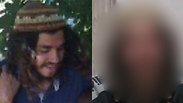
Court to determine submissibility of Duma arson defendants' confessions
Families of main defendant Amiram Ben-Uliel and another suspect say state has asked the district court to recognize 'special measures' used in interrogations as lawful and submissible in court; 'They're asking a court in Israel to recognize torture as legal,' relative says.
The attack, which took place in late July 2015, claimed the lives of three members of the Dawabsheh family and left another seriously wounded. Two Jewish suspects were arrested and indicted in the case, Amiram Ben-Uliel and another suspect, who was a minor at the time of the attack.
Ben-Uliel was charged with three counts of murder, two counts of attempted murder, two counts of arson, and one count of conspiring to commit a nationalistically-motivated crime. The second suspect was charged with one count of conspiring to commit a nationalistically-motivated crime. He is also suspected of involvement in the arson at Dormition Abbey.
Their trial has been ongoing away from the media spotlight.
The submissibility of the defendants' confessions is an important question, as according to Shin Bet investigators, the confessions serve as the "golden evidence" in the case.
According to the defendants' families, the state has asked the court to recognize the "necessity investigations"—in which physical measures were used—as legal.
While the state's request does note that torture is forbidden and wrong in investigations in Israel, the prosecution has nevertheless asked the court to determine that the measures used in the interrogation of Ben-Uliel and the second defendant "are not improper measures or measures used unlawfully," as well as rule that "the torture was legally carried out," according to the suspects' families.
"Everything is done under secrecy; everything is done away from the public eye. Any citizen who would've seen this request would not have been able to fall asleep at night," sources from the second defendant's family told Ynet. "They're asking a court in Israel to recognize torture as legal. This is delusional, it's concerning and above all, it is patently illegal."
Dozens of hearings were held to examine the submissibility of the confessions, in which many Shin Bet and police officials testified about the manner of investigation and the special measures that were used.
During these discussions, the prosecution tried to convince the judges that despite the use of "the unusual measures" in the interrogation of the defendants, their confessions were given "willingly," according to the families.
"To show that torture is not so terrible, the prosecution dares to write to the court that while torturing, they stuck to the rules, used judgment, and the most outrageous thing—they write that everything has been done while 'maintaining the defendants' dignity as much as possible.' They were tortured while their dignity was maintained—that's what an official document by the State of Israel says in 2018. It's unbelievable," one relative said.











